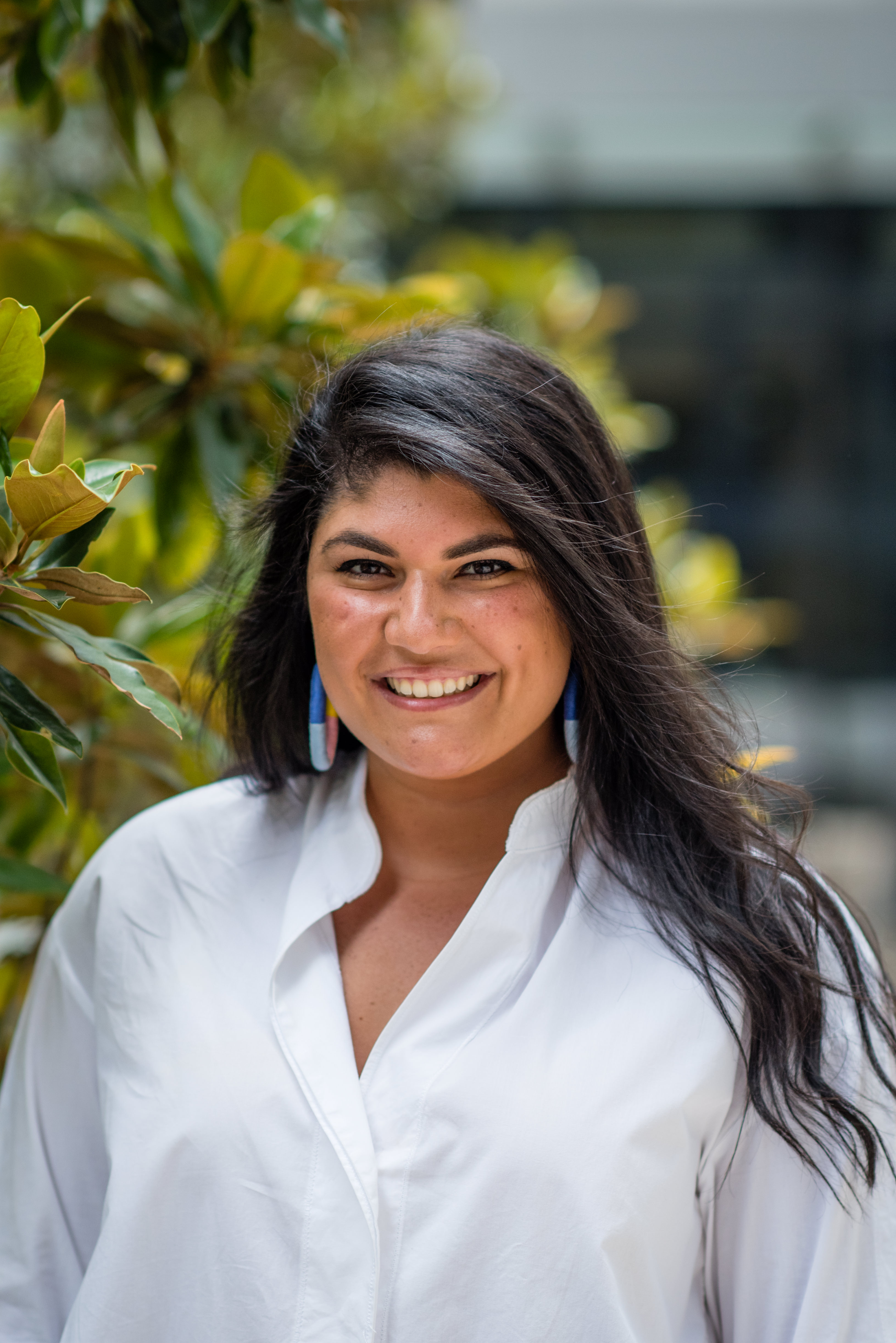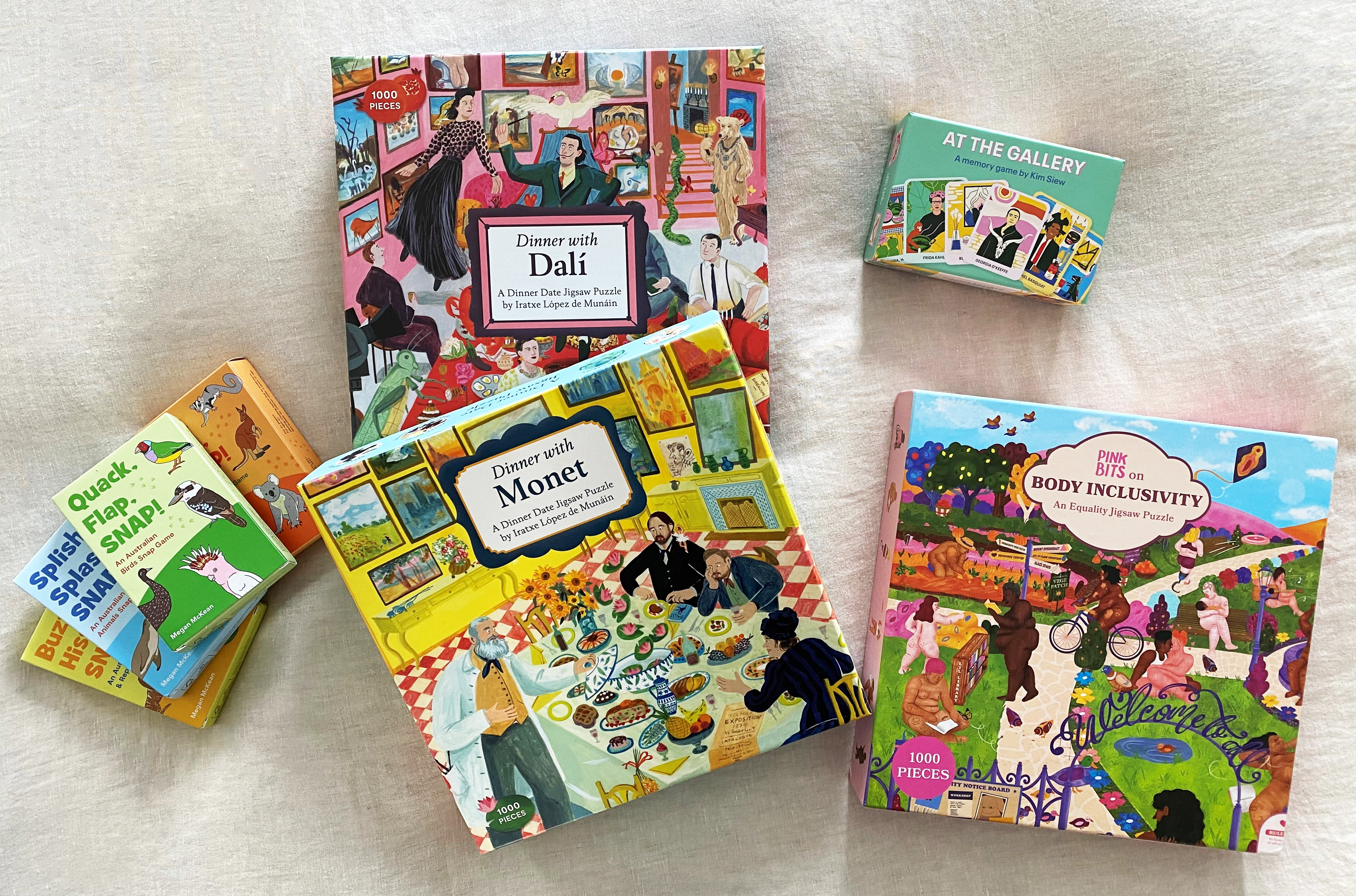
Bianca Jafari
Product Development Executive, Thames & Hudson
From fact-checking Australian native animals to supplying annual ‘gift fairs’, no two days are the same for Product Development Executive Bianca Jafari. Here, she talks about her pathway to publishing, key skills needed to excel in her line of work, and where she hopes the industry is headed in the future.
Can you describe your current role for us?
My current title at Thames and Hudson Australia is Product Development Executive. I develop around twelve gift products a year – books, games and puzzles. I’ll think up an idea, do market research, commission and manage the artist, work with the designer and plan and execute the publicity campaign.
My list is made up of totally new ideas, plus a few things that have been inspired by existing THA content. I’m always asking myself how a best-selling THA book can be presented in a new format to make it more accessible for a different audience.
The role of product development is relatively uncommon in Australian publishing. There are parts of it that are very similar to a commissioning editor role, but working on gift products means that there are also some key differences. In addition to much shorter turnaround times (sometimes as little as eight months from brainwave to bookshelf!), my projects don’t usually require an editor, which is unheard of in book publishing. Additionally, my projects sit in a different space in the market – they’re still sold through bookshops, but they can also be found in small gift stores, clothing shops, lifestyle shops, newsagencies and – my favourite – at annual gift fairs.
The team at THA is quite small – there’s about 28 of us. My role sits within the publishing and editorial department, which is nine people. I report directly to the publisher and I work closest with the production manager.
What does a typical day in your job look like?
Every day is different. It’s a lot of brainstorming and researching and any given day will involve a mixture of these tasks:
- Audience research in order to develop a new idea – trawling through Instagram, going into bookshops, chatting to different people
- Product research – looking at packaging options, their pros and cons, what products they’re best suited to
- Connecting with like minded creatives who inspire me and then inviting them to collaborate
- Working with the production manager to make sure that all projects meet budget requirements
- Briefing an illustrator or designer and then providing ongoing feedback
- Writing text – blurbs, instructions, sales points, or anything else needed for the packaging or the sales material
- Reaching out to other teams for feedback, especially the sales team
- Fact checking! I’ve been deep in native Australian animals for the last six months, which lends itself to a number of debates – frilled-neck lizard or frill-necked lizard?
What was your pathway to working in publishing?
I completed my undergrad in media and communications at RMIT, where I specialised in radio. Whilst I was studying, I was working as a sales rep for Foxtel. When I finished my undergrad, I was offered a full-time position as national sales support. After a few years, the laws changed for door-to-door sales and our whole team was made redundant. Before I started my new role in product development, being made redundant at 22 was probably the highlight of my career. It was the first time in my working life that I felt like I had options. It gave me the financial privilege to slow down and reassess what I wanted for my career. After a few months off, I enrolled in an online professional editing and proofreading course. I spent the next three years freelancing as a non-fiction ghost writer, copy editor and proofreader, where I worked on blogs, academic work and financial writing and eventually completed my masters in publishing and communications at the University of Melbourne.
In my final year of masters, I landed myself a spot at Melbourne uni’s student-led publishing house, Grattan Street Press, which eventually led to an internship at Hardie Grant Egmont. From there, I came to know about the role being advertised at Thames and Hudson Australia. The role was to represent one of THA’s distributed publishers, Laurence King Publishing. LKP was a world leader for all things gift, so I knew this was an experience I couldn’t get at any other Australian publishing house. When I interviewed for the role, it was my sales experience that set me apart from other applicants.
After about a year working on the LKP list, I was given the opportunity to bring to life my own edition for their bestselling bingo series. In July 2020, LKP published Australia’s Deadly Animals Bingo, which I developed and produced end-to-end. The success of the game paired with my insight into the gift industry eventually led to my current role as Product Development Executive.
My first project published in July, Dinner with Monet, and I have five more exciting projects still to come for 2021 before my full program takes off in 2022.
What do you find most rewarding about your job?
I am beyond grateful for the list of inspiring independent women artists, designers and illustrators that I work with. Not only have they produced incredible work, but they’ve also taught me so much about business, about creativity and about collaboration. Working with them on a vision we both share is hugely rewarding.
And something I can’t overlook – the job satisfaction that comes with having an employer that values my voice, believes in my ideas and backs my decisions. To have my own list after two years in publishing is a pinch-me moment.
What would you say are the three most crucial skills needed to be successful at your job?
Understanding your audience and listening to them: a clear audience (even a wide one) will mean that colour selection, language choice and design decisions will be that little bit easier. It also ensures that sales, marketing and publicity can be a lot more targeted and effective. Once you know your audience, all decisions you make should be with them in mind, despite your own personal preferences.
People skills: everything from being easy to work with, to knowing how to manage expectations with empathy and consideration. My ability to connect with and work with stakeholders is what makes this all possible – it makes creatives want to work with me despite not receiving huge payments and makes the team at THA back me even if there’s nothing similar in the market.
Passion: yes, it’s cliche but it’s undoubtedly the most important thing. Books and puzzles and games are luxury items and the best ones have been brought to life mindfully by people who are passionate about them. In my personal career, passion is what landed me all the jobs that I was underqualified for on paper (including this one!) and what motivates me to be successful.
 Gift products Bianca has worked on.
Gift products Bianca has worked on.
Where do you see the industry headed in the future? And do you see your role as needing to change or adapt?
From when I started to now, I feel like there’s already been some change. First and foremost, more and more publishers are stepping up to tackle the issues of diversity and inclusivity, including THA. It’s not enough to publish more diverse stories, we need to include these voices in the decision-making process, in the editing process, in the sales process. A huge barrier to inclusivity is the pay and I’m hoping that a push for transparency around remuneration raises the bar for entry-level roles in the future.
Books will always be queen but don’t underestimate the power of gift. More and more often someone enters a bookshop and leaves with a puzzle, a card game or a tote bag. And there’s more of that to come! I expect the future of publishing to have to go beyond the book – whether that’s curated book playlists, accompanying online games or apps or simply more gift products. I’m publishing in a relatively new, relatively trend-focused market so undoubtedly my role will need to change and adapt – the way I commission and what I commission will be shaped by how the industry evolves.
What advice would you offer to someone looking to get started in your area of work?
There are so many people out there studying the same degree and fighting for the same entry-level role. My advice would be to get as involved as possible, in whatever capacity you can – internships, freelance writing, attending free book events. It’s a small industry and a recommendation goes a really long way.
When opportunities arise, be the person who goes for the rep job, the production job or the publicity job – there’s so much more to publishing than being an editor. When there’s no opportunities available, find a job that will give you the skills to stand out from other applicants – a sales or PR job will almost always put you in good stead.
Don’t be disheartened by what you perceive the industry to be; there’s lots of room for us non-book people to do something a little different, whether that’s working in rights, in production or even in gift.
And lastly, established women in publishing are often supported by a man in a high-paying non-publishing role. If that’s not going to be you, don’t be alarmed. It’s definitely not me. Once you’ve landed a job in the industry, set yourself a goal and put together a timeline of where you want to be in one, three and five years time. Have open conversations about pay, pitch your skills proudly and don’t be afraid to work outside your job description if it can progress your career. The publishing industry is really exciting right now and it can only get better from here.